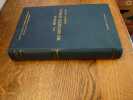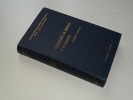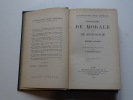203 books for « herbert spencer »Edit
-
Type
Book (198)
Music sheets (5)
-
Language
English (3)
French (163)
Russian (37)
-
Century
19th (63)
20th (50)
-
Countries
Belgium (22)
Canada (1)
Denmark (11)
France (126)
Switzerland (6)
United States of America (37)
-
Syndicate
ALAC (1)
CLAM (2)
CLAQ (1)
ILAB (94)
NVVA (1)
SLACES (1)
SLAM (79)
Topics
- Biology (7)
- Castelot andré (1)
- Discipline (1)
- Early printed books (1)
- Education (17)
- Education - morals (2)
- Ethic (2)
- Ethic (1)
- Ethnology (2)
- Evolutionism (1)
- First edition (1)
- History (3)
- Huxley aldous (2)
- Instruments (1)
- Instruments (1)
- Literature (2)
- Magazine (3)
- Newspapers press (3)
- Philosophy (27)
- Physical training (1)
- Policy (4)
- Psychology (4)
- Religions (3)
- Reviews (3)
- Sciences (4)
- Scores (7)
- Social sciences (1)
- Sociology (13)
- Songs (5)
- Spencer herbert (89)
- Teaching (6)
- Testimonies / stories (1)
- Viticulture (1)
- War (1)
- Wine (1)
- Xixth century (1)
- Zoology (5)
TYPOGRAPHICA. Nouvelle série. N° 1 à 16.
Herbert Spencer, 1960 à 1967. 27,5 x 21,5 cm, une soixantaine de pages pour chaque numéro. 15 numéros, manque le numéro 11 pour lequel nous avons seulement deux tirés à part du texte sur Robert Massin publié dans ce numéro 11. Les numéros 10 et 13 ont la couverture légèrement abîmés sinon beaux exemplaires. Il s'agit des exemplaires provenant de la bibliothèque de Robert Massin, son tampon se trouve dans la plupart des numéros. Contributions d'artistes, notamment : Dieter Rot, Alexander Rodchenko, Herbert Bayer, John Heartfield, Kurt Schwitters et des articles aussi variés que Road Signs in Holland, Penguins on the March (examen du design Penguin), Sex and Typography, Tombstone Lettering on Slate... La revueTypographica d'Herbert Spencer a fusionné la nouvelle typographie et le graphisme, l'art d'avant-garde, l'histoire de l'imprimerie, les récits des pionniers modernistes et la photographie environnementale pour créer l'une des revues les plus remarquables de l'édition britannique. Typographica était originale non seulement par la cohérence de sa vision éditoriale mais aussi par sa longévité : elle fut publiée à Londres en deux séries de seize numéros chacune, de 1949 à 1967. Il s'agit là de la deuxième série.
Heredity, Variation and Evolution in Protozoa. I. The Fate of New Structural Characters in Paramecium, in Connection with the Problem of the Inheritance of Acquired Characters in Unicellular Organisms.
Baltimore, Williams & Wilkins Company, 1908. Royal8vo. Offprint, uncut, unopened in the original printed wrappers. Reprinted from ""The Journal of Experimental Zoölogy"", Vol. V [5], No. 4. Light miscolouring to front wrapper, otherwise a very fine and clean copy. 577-632 pp.
Scarce offprint of Jennings' important work in which he published the results of his investigations of heredity and selection in Paramecium. ""Most of this lons paper was devoted to a study of the effects of environment and growth upon the sizes of Paramecium, both effects were found to be quite large. (Provine, The Origins of Theoretical Population Genetics, P. 100)""Herbert Spencer Jennings was widely recognized and greatly respected not only as a pioneering biological investigator but also as a thinker, philosopher, and educator . He was a master of the art of setting forth simply, clearly, and vividly, in print and in public lectures, the current state of genetics and general biology and of recognizing and pointing out their implications for the general public and for specialists in various disciplines. ""Herbert Spencer Jennings (1868-1947), American botanist who was trained at Illinois Normal School and the University of Michigan, then spent a year studying protozoans with Max Verworn at the zoological station in Naples. In the early twentieth century, Jennings began studying inheritance and evolution in protozoans and introduced new experimental methods for laboratory study. By 1920 he had left the laboratory to popularize genetics and harmonize the relationship between biology, religion, and the humanities.
Rivages : Flore et faune européennes eSeashores, a guide to animal and plants along the beachese, par L. Ingle et H. S. Zim. Adaptation française de Jacques Rocheville [Unknown Binding] Zim, Herbert Spencer; Ingle, Lester and Rocheville, Jacques
Hachette Broché bon état.Contenu propre . Couverture jaunie . 1962. 159 pages .PHOTOS SUR DEMANDE
Merci de nous contacter à l'avance si vous souhaitez consulter une référence dans notre boutique à Authon-du-Perche.
Diverse Ideals and Divergent Conclusions in the Study of Behavior in Lower Organisms.
[Unknown printer], 1910. 8vo. Offprint in the original printed wrappers. Reprinted from ""American Journal of Psychology, July, 1910, Vol. XXI, pp. 349-370"". Previous owner's name written to top right corner of front wrapper. A very fine and clean copy. (2), 22 pp.
First printing of Jennings paper on the behavior of the lowest organisms. Jennings ""published an important essay in 1910 [the present], in which he set forth his methodological credo regarding the then prevailing trends in the study of animal behavior."" (Cordeschi, The discovery of the artificial: behavior, mind, and machines, p. 17).Herbert Spencer Jennings (1868-1947), American botanist who was trained at Illinois Normal School and the University of Michigan, then spent a year studying protozoans with Max Verworn at the zoological station in Naples. In the early twentieth century, Jennings began studying inheritance and evolution in protozoans and introduced new experimental methods for laboratory study. By 1920 he had left the laboratory to popularize genetics and harmonize the relationship between biology, religion, and the humanities.
The Interpretation of the Behavior of the Lower Organisms.
[No place], 1908. 8vo. Original wrappers, stapled. Previous owner's name stamped to top of front wrapper. Edges chipped. 13 pp.
Rare offprint [""Reprinted from Science, N. S., Vol. XXVII., No. 969, Pages 698-710, May 1, 1908""] of Jennings' paper on the behavior of the lower organisms. The paper is a response to the criticism of his volume ""Behavior of the Lower Organisms"". Herbert Spencer Jennings (1868-1947), American botanist who was trained at Illinois Normal School and the University of Michigan, then spent a year studying protozoans with Max Verworn at the zoological station in Naples. In the early twentieth century, Jennings began studying inheritance and evolution in protozoans and introduced new experimental methods for laboratory study. By 1920 he had left the laboratory to popularize genetics and harmonize the relationship between biology, religion, and the humanities.
Experimental Evidence on the Effectiveness of Selection.
New York, 1910. 8vo. Original printed wrappers, unopened. Previous owner's name to top right corner of front wrapper. A very fine and clean copy. Pp. 136-145.
Offprint [""Reprinted, without change of printing, from ""American Naturalist""] of Jennings' paper on the effects of selection of pure lines of Paramecia. Herbert Spencer Jennings (1868-1947), American botanist who was trained at Illinois Normal School and the University of Michigan, then spent a year studying protozoans with Max Verworn at the zoological station in Naples. In the early twentieth century, Jennings began studying inheritance and evolution in protozoans and introduced new experimental methods for laboratory study. By 1920 he had left the laboratory to popularize genetics and harmonize the relationship between biology, religion, and the humanities.
The Work of J. Von Uexkuell on the Physiology of Movements and behavior.
(No printer), 1909. Royal8vo. Uncut, unopened in the original printed wrappers. Offprint from ""The Journal of Comparative Neurology and Psychology"", Vol. XIX, No. 3, June, 1909. Previous owner's name written to top right corner of front wrapper. A very fine and clean copy. Pp. 313-336.
Rare offprint issue. Herbert Spencer Jennings (1868-1947), American botanist who was trained at Illinois Normal School and the University of Michigan, then spent a year studying protozoans with Max Verworn at the zoological station in Naples. In the early twentieth century, Jennings began studying inheritance and evolution in protozoans and introduced new experimental methods for laboratory study. By 1920 he had left the laboratory to popularize genetics and harmonize the relationship between biology, religion, and the humanities.
The Method of Regulation in Behavior and in Other Fields.
Baltimore, 1905. Royal8vo. Offprint in the original printed wrappers. Uncut. Reprinted from ""The Journal of Experimental Zoölogy"", Vol. II [2], No. 4. A very fine and clean copy. 473-494 pp.
Offprint of Jennings' paper in which he gives a general outline of the method of regulation shown in the behavior of the lower organisms.Herbert Spencer Jennings (1868-1947), American botanist who was trained at Illinois Normal School and the University of Michigan, then spent a year studying protozoans with Max Verworn at the zoological station in Naples. In the early twentieth century, Jennings began studying inheritance and evolution in protozoans and introduced new experimental methods for laboratory study. By 1920 he had left the laboratory to popularize genetics and harmonize the relationship between biology, religion, and the humanities.
De l'éducation intellectuelle, morale et physique
G. Baillière | Paris 1878 | 14 x 22.50 cm | relié
Nouvelle édition de la traduction française. Reliure en demi basane chocolat, dos àquatre nerfs comportant de petites traces de frottements orné de fleurons dorés, coins légèrement émoussés, reliure de l'époque. Ex-libris encollé au verso du premier plat, exemplaire quasi exempt de rousseurs. - Photographies et détails sur www.Edition-Originale.com -


Phone number : 01 56 08 08 85
La morale des différents peuples et la morale personnelle. Traduction de M. E. Castelot et M. Étienne Martin Saint-Léon.
Paris, Librairie Guillaumin et Cie, 1893. 23,5 x 15 cm, iii-386 pp. et 24 pp. de catalogue. Relié cartonnage d'éditeur pleine percaline bleue. Très bel exemplaire. Édition originale française.
An autobiography - VOLUME I + VOLUME II
Williams and Norgate 1904 in8. 1904. Cartonné. 2 volume(s).
Bon Etat de conservation intérieurs propres tranches tachées de rousseurs bonne tenue
Myths & Legends of All Nations
Bantam Book broché Couverture Illustrée New York 1961
Bon État
A plea for liberty. An argument against socialism and socialistic legislation. Consisting of an introduction by Herbert Spencer and essays by various writers.
London, John Murray, 1891, xxii pp + 414 pp, publisher's red cloth with gilt lettering on front cover and spine, binding a bit loose, spine with signs of use, flyleaves browned, small tear in halftitle, notwithstanding these defects still an acceptable copy of the first edition.
Le Rôle moral de la bienfaisance
Guillaumin et Cie . Paris 1895
Bon état Demi reliure à nerfs, dos orné ( pièce de titre et fleurons ) Premier plat avec couronne de feuilles et mention : lycée du Havre. Philosophie Sociologie XIXe - largeur/hauteur :14x22 cm - poid : 630 g - nombre de pages : 258 p. - langue : Français
Problèmes de morale et de sociologie
Paris, Guillaumin & Cie, éditeurs. Coll. d'auteurs étrangers contemporains, 1894, in-8, reliure toile éditeur, titre à l'or, 376 pages. Suivi d'un dictionnaire d'économie politique publié sous la direction de Léon Say et de Joseph Chailley. Bon état.
NB : En ces derniers jours de l'année, les questions et commandes sont traitées dans les 24h et les envois reprendront à partir du 5 janvier. Merci.
Comparative Psychology.
[No printer], 1909. Royal8vo. Offprint in the original printed wrappers. Unopened and uncut. Reprinted from ""The American Naturalist, Vol. XLIII., October, 1909"". Previous owner's name written to top right corner of front wrapper. A very fine and clean copy. 619-633 pp.
Rare offprint edition of Jenning's review of George Bohn's work ""La Naissance de l'Intelligence"".
INTRODUCTION A LA SCIENCE SOCIALE
GERMER BAILLIERE ET CIE. 1878. In-12. Cartonnage d'éditeurs. Etat d'usage, Couv. convenable, Mors fendus, Intérieur frais. 439 pages. Titre et fleurons dorés.. . . . Classification Dewey : 300-SCIENCES SOCIALES
Troisième édition. Bibliothèque scientifique intenrationale. Classification Dewey : 300-SCIENCES SOCIALES
ESSAIS DE MORALE DE SCIENCE ET D'ESTHETIQUE - TOME I : ESSAIS SUR LE PROGRES
GERMER BAILLIERE ET CIE. 1879. In-8. Relié demi-cuir. Bon état, Coins frottés, Dos à nerfs, Intérieur frais. 414 pages. Pièce de titre et d'auteur sur cuir ornés de filets dorés. Quelques épidermures sur le cuir.. . . . Classification Dewey : 100-PHILOSOPHIE ET DISCIPLINES CONNEXES
Traduits de l'anglais par M. A. Burdeau. Classification Dewey : 100-PHILOSOPHIE ET DISCIPLINES CONNEXES
Classification des sciences
Germer Baillière. 1872. In-12. Broché. Bon état, Couv. légèrement passée, Dos satisfaisant, Intérieur frais. 160 pages. Dos légèrement passé.. . . . Classification Dewey : 500-SCIENCES DE LA NATURE ET MATHEMATIQUES
traduit d l'anglais sur la 3ème édition par Rethoré, Collection Bibliothèque de philosophie contemporaine Classification Dewey : 500-SCIENCES DE LA NATURE ET MATHEMATIQUES
LES BASES DE LA MORALE EVOLUTIONNISTE
FELIX ALCAN. 1901. In-8. Relié. Etat d'usage, Couv. convenable, Coiffe en pied abîmée, Intérieur frais. 247 pages.. . . . Classification Dewey : 800-LITTERATURE (BELLES-LETTRES)
Classification Dewey : 800-LITTERATURE (BELLES-LETTRES)
LA MORALE DES DIFFERENTS PAUPLES ET LA MORALE PERSONNELLE.
LIBRAIRIE GUILLAUMIN ET Cie. 1896. In-8. Cartonnage d'éditeurs. Etat d'usage, Couv. légèrement passée, Dos frotté, Intérieur frais. 386 pages. Toile bleu marine, titres dorés. Tampons e bibliothèque.. . . . Classification Dewey : 210-Philosophie et théorie
Traduction de M.E. Castelot et M. Etiene Martin Saint-Léon. Classification Dewey : 210-Philosophie et théorie
The Principles of Biology. 3 vols. - [COINING THE TERM ""SURVIVAL OF THE FITTEST""]
London, William and Norgate, 1883,1885. 8vo. 3 uniform volumes partly uncut in the original embossed cloth. Volume 1 being the revised and enlarged third edition, Volume II (in two parts) being the second edition. Miscolouring to extremities, otherwise a fine set. XII, 883, 16 pp." (2), II, (2), 237, (1), 16 pp." Pp. VI, (4), 229-682, X, 16.
A collected set of the second edition and much enlarged third edition of this magnum opus of biology, in which Spencer coined the term ""survival of the fittest"". ""This survival of the fittest, which I have here sought to express in mechanical terms, is that which Mr Darwin has called ""natural selection, or the preservation of favoured races in the struggle for life"""". (Spencer, Herbert. The Principles of Biology, Vol. I, p. 444).Together with Charles Darwin and Thomas Huxley, Herbert Spencer (1820 - 1903) was responsible for the acceptance of the theory of evolution. His greatest and most influential work in this connection was his ""The Principles of Biology"", which forms the biological part of his grand project for a Synthetic Philosophy, which he worked on from 1862 to 1893. It is on this work that his fame today mainly rests, not least because it was here that he was the first to use the term ""survival of the fittest"" and due to this work that he greatly helped spread the acceptance of the theory of evolution.""The Principles of Biology attempted to reconcile the new Darwinian theory of natural selection with the Lamarckian mechanism of acquired characteristics which Spencer had endorsed long before publication of the Origin of the Species. In Spencer's view, while the Darwinian theory could explain most of biological evolution, the Lamarckian mechanism was necessary to explain 'higher' evolution, and especially the social behavior of humanity. Both theories however, instantiated the principle of evolution. In this sense, therefore, it is incorrect to characterize Spencer as a follower of Darwin. Although he coined the phrase 'survival of the fittest', and is often misrepresented as a thinker who merely applied the Darwininan theory to society, he did not aim to generalize Darwin, but rather to show that natural selection could be accommodated within an overarching principle of evolution that Spencer had independently developed. Biological organisms could be shown to progress, both as individuals and as species, from simple, undifferentiated, homogeneity to complex, differentiated, heterogeneity"" the Darwinian theory was only of significance in providing a partial explanation for this universally observed tendency"" (Dictionary of Nineteenth-Century British Philosophy vol. 2:1055).""Spencer saw higher forms emerging from a gradual process of adaptation to the environment. The Principles of Biology analyzes the principal mechanisms by which this occurs and relates them to the specialized structures and function of plants and animals."" (D.S.B.: XII, 571).The work was originally issued to subscribers in parts from January 1863 to October 1864 (Vol. I) and January 1865 to March 1867 (Vol. II).
Collins G. Spencer G. Herbert Spencers Philosophy in Abbreviation of Howard Co
Collins G. Spencer G. Herbert Spencers Philosophy in Abbreviation of Howard Collins. In Russian (ask us if in doubt)/Kollins G. Spenser G. Filosofiya Gerberta Spensera v sokrashchennom izlozhenii Govarda Kollinsa. With a foreword by Herbert Spencer. Edition by F. Pavlenkov. St. Petersburg Typography by I. G. Salov Meshchanskaya Street # 5. 1892. VIII 472 VIII 1 c. SKUalb6aa0cc9e07e33772.
Résumé de la philosophie synthétique de Herbert Spencer. Précédé d'une préface de Herbert Spencer. Traduction française par Henry de Varigny.
In-8, broché (couv. lég. défr.), xi, 690 p. Paris, Félix Alcan, 1911.


Phone number : 33 01 47 07 40 60
Collins G., Spencer G. Herbert Spencers Philosophy in Abbreviation of Howard C
Collins G., Spencer G. Herbert Spencers Philosophy in Abbreviation of Howard Collins. In Russian /Kollins G., Spenser G. Filosofiya Gerberta Spensera v sokrashchennom izlozhenii Govarda Kollinsa. With a foreword by G. Spencer. Translation from English by P.V.Mokievsky. St. Petersburg. Edition by F. Pavlenkov. 1892. 472, VIII p. We have thousands of titles and often several copies of each title may be available. Please feel free to contact us for a detailed description of the copies available. SKUalb3a795ea0d37b5409.
 Write to the booksellers
Write to the booksellers














